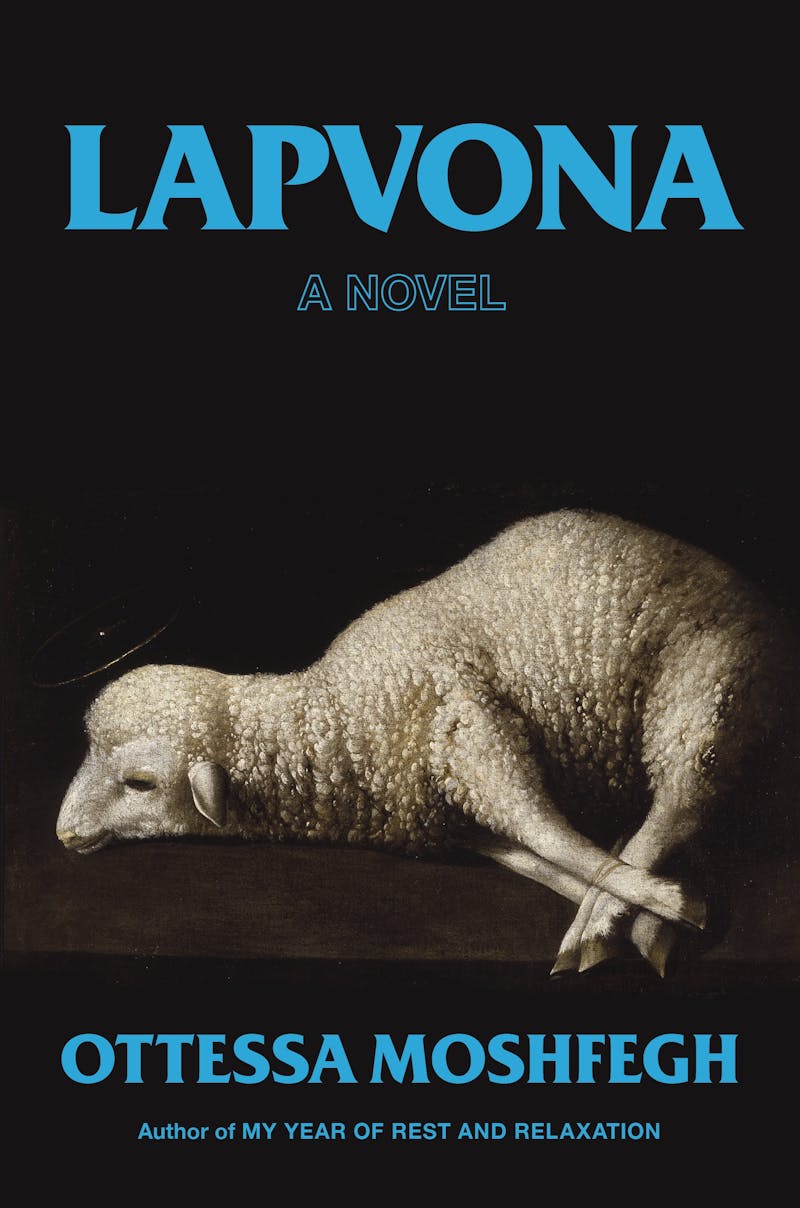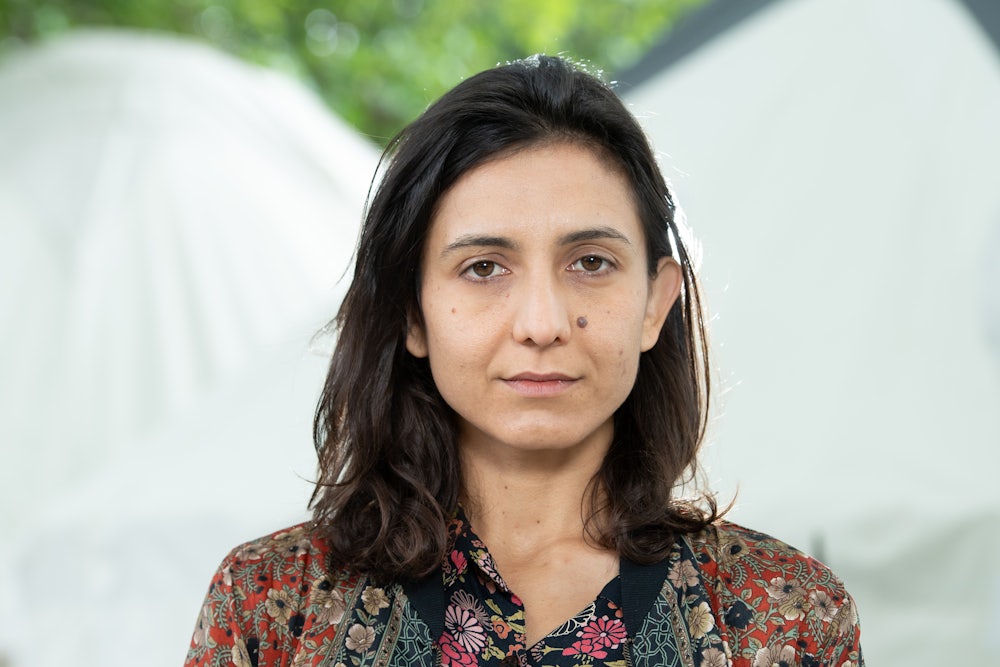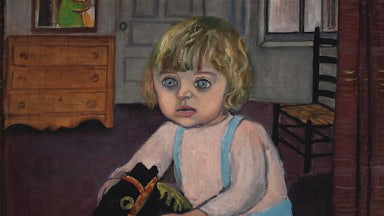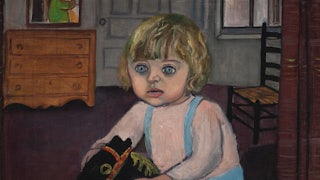In the medium of bodily fluids, Ottessa Moshfegh is a virtuoso. Since her debut novella, McGlue, which opens with a dazed sailor waking to discover his “shirtfront is stiff and bibbed brown” with blood, Moshfegh has cycled through an array of genres. She has published a neo-noir (Eileen), a 9/11 novel (My Year of Rest and Relaxation), a riff on the cozy mystery (Death in Her Hands), a story collection (Homesick for Another World), and, now, with Lapvona, a quasi-religious parable set in Europe’s Dark Ages. Across this varied body of work, secretions are a constant: Her characters release great torrents of laxative-induced excrement; have concerningly odorous urine; vomit “sour, milk-flavored syrup”; flay their backs open with whips; and pick at the cystic acne that studs their faces with “big red boils of pus.”
While the sheer quantity of these details suggests that Moshfegh takes a certain relish in grossing out her readers, the blood, shit, and puke that her books bathe in serve a purpose beyond mere shock value. They are also a symptom of her interest in the abject, defined by the psychoanalyst Julia Kristeva as that which “disturbs identity, system” and “does not respect borders, positions, rules”—especially the border between life and death, existence and nonexistence. Waste, sweat, and other by-products expelled by the body repulse us, Kristeva argues, because they are harbingers of our eventual decomposition; processes that keep us alive but nonetheless ferry us closer to death with each repetition.

In her own telling, Moshfegh has been fixated on the inevitability of death and conditionality of life since she was a small child. After being put in time out in kindergarten, she recalled in 2018,
a black hole opened before my feet and I looked down into eternity. I heard a voice echo up from the hole and say to me with complete authority: “You will die one day.” Well, shit, I thought. How could I face my classmates now, having seen what I’d seen and learned what I’d heard?
In a 2020 interview with The Believer, she elaborated, “I still just can’t believe I exist now. And one day I won’t, and thirty-nine years ago, I didn’t.” This obsessive line of thought is evident in her work. Her narratives often feature people on the brink of nonexistence, a point they rarely arrive at naturally: murder (real or imagined), suicide, and other forms of self-destruction proliferate throughout her oeuvre. Perhaps Moshfegh’s most abject work is 2018’s My Year of Rest and Relaxation, which follows a protagonist’s quest to put herself into a medically induced coma with prescriptions written by a comically unscrupulous shrink from the yellow pages, thereby achieving a kind of death in life: the ultimate blurring of boundaries.
Her most abject work until now, that is. The setting of her new novel, Lapvona—a vaguely occult feudal village besieged by bandits and famine—allows Moshfegh to dial her gore levels up to 11. To a familiar portfolio of depravity, she adds incest, cannibalism, torture, and implied pedophilia. One character inserts a grape into his anus before tossing it into a servant’s open mouth. Another cuts out the eyes of a horse in order to replace her own blind ones, which she keeps folded in a cloth until they become “shriveled and black and [smell] of rotten fish.” Corpses pile up and are dumped in shallow graves or roasted over spits. Why all this excess, such a marked increase in gratuitousness from Moshfegh’s earlier fiction?
Lapvona records five seasons in the life of the titular village, a devout, vaguely European agricultural community in the shadow of a manor whose lord owns the land that the residents farm and to whom they must pay taxes. The events it documents take place “hundreds of years” after the birth of Christ, but Moshfegh’s prose style makes few concessions to historical verisimilitude—bewilderingly, some of the only affected words she uses are “sheath” (meaning vagina) and “pubis.”
Unlike her previous novels, most of which are written in the first person, Lapvona is not centered around a single, caustic intelligence; instead, her close-third narration flits from consciousness to consciousness in a large cast of characters. There is the shepherd Jude and his disabled son Marek, who is possessed by “inner darkness” and lives in fear of God’s wrath; Marek’s mother, Agata, whom he believes to be dead but who is alive and hiding in a convent; the lord of the manor, Villiam, as well as his family, servants, and entourage; the village wet nurse turned medicine woman, Ina, who collects herbs and communes with birds from her secluded cabin; and the skeptic Grigor, whose grandchildren are slain by bandits in the book’s opening pages. Moshfegh’s narrative sets them all on a collision course, with deadly results.
Dramatic irony is the primary driver of the plot. At the start of the novel, Lapvonians are living in the dark on many fronts. They practice a form of Christianity that requires them to keep a vegetarian diet, but they don’t realize their priest, Father Barnabas, is a charlatan, who gorges himself on meat at the manor every night. Nor do they know it is Villiam who controls the bandits menacing them, paying pillagers “to ransack the village any time there was a rumor of dissent among the farmers.” And most of them have no idea Villiam is diverting snowmelt from the mountains surrounding Lapvona, an essential source of drinking water, for his own gardens and recreation.
The unraveling of these braided lies begins with a murder. Marek is fresh off a brutal beating from Jude when he runs into Villiam’s son, Jacob, on a secluded forest path. The two boys go in search of cliff birds, but when they get to the top of the mountain, Marek hurls a stone at Jacob, who falls over the edge of a cliff and onto an outcropping below. A pool of blood oozes “like a halo around the boy’s head.” Rather than punishing Marek for this random act of violence, however, or providing readers with an extended study of a soul in crisis, Moshfegh’s narrative thrusts him into the lap of luxury. Villiam, who has an insatiable desire to be “entertained, cajoled, mystified,” ideally by “the humiliation of others,” doesn’t grieve his son’s death; instead, he invites Marek into the manor as a replacement heir.
These events are only a prelude to the greater brutality to come. Misery, in Moshfegh’s novel, is as ubiquitous as it is arbitrary. Lapvona soon enters a period of drought and heat so intense that rivers run dry and no crops will grow. While Villiam’s water hoarding ensures that the manor lacks neither resources nor scenery, by midsummer, most of the surviving villagers have decamped to a dwindling lake. There, they are reduced to eating “dead bees, rats, vermin, worms, dirt, and even old, desiccated cakes of animal dung”—not to mention each other. These scenes are nauseating on their own, and all the more so for how inert they feel: The suffering accrues, but to no real end. By the time Jude belches up an old man’s undigested pinky toe, the effect of such outrageous images is more tiresome than provoking: almost adolescent.
Experiences of violence and cruelty have previously been catalysts for change in Moshfegh’s characters: It’s only after the titular Eileen is drawn into a hostage situation gone badly wrong that she escapes the stifling town of X-ville and her dead-end prison job; in Death in Her Hands, narrator Vesta’s discovery of a mysterious note referring to a woman’s murder lends some paranoiac purpose to the life of the lonely widow. This is not the case in Lapvona, where, faced with the prospect of their own extinction, the villagers resort to social and literal cannibalism rather than trouble the status quo—such as by making any demands for assistance from the man theoretically responsible for Lapvona’s well-being. They are pacified by the ad-libbed sermons of Father Barnabas, who, to deflect suspicion about Villiam’s culpability, explains the famine to his parishioners this way: “The Devil got out of hell and is on the loose, hungry for innocent souls.”
The degradation in Lapvona is notable not just for its intensity but for how contrived it feels—as if Moshfegh has populated an entire medieval world just to subject her own creations to monstrous experiments. It is only late in the novel that she gestures toward justifying this sadism, voicing a kind of defense of authorial cruelty through the elderly Grigor. He believes it is in extremity that human nature is truly revealed: “When God gives you more than you can tolerate, you turn to instinct. And instinct is a force beyond anyone’s control.” Moshfegh herself has remarked that writing Lapvona gave her “a place to put all the things that I don’t necessarily understand about … why we do the things that we do to each other.”
If the resulting novel represents an attempt to get to the bottom of it, the answer seems to have eluded her. Rather than pulling off a theory of inhumanity, Lapvona makes an unconvincing scapegoat of organized religion. Moshfegh pointedly frustrates her characters’ search for meaning, and never more so than when they seek it in the church. Her disdain for her characters’ faith is evident from Lapvona’s first page, which features the ironic epigraph “I feel stupid when I pray,” a lyric from a 2020 ballad by pop singer and former Disney star Demi Lovato. Unsurprisingly, the Lapvonians who pray are overwhelmingly depicted as stupid, or at the very least hampered by delusion. Throughout the novel, worship is at worst a form of social control and at best an exercise in narcissism. Within the village, “the little gift of religion” that Father Barnabas bestows upon his congregation is “enough to fool them into accepting their poverty and enslavement.”
Any critique of the role religion plays in justifying barbarism and oppression, however, is muddled by the fact that those who can sense the ruling class’s worldliness and corruption hardly come off better. Most of the characters in the book simply disdain other people, period. After a few months in the manor, Marek realizes that the tranquil disposition of Villiam’s pious servants conceals the “disgust and pity” with which they regard their masters’ lives of leisure; one maid smugly imagines that she is God’s favorite due to the fact that she eats only a few cabbage leaves a day. Such acts of self-denial are shown to be for naught: God exhibits a blasé indifference toward suffering. When Jude calls out to be struck down for his sins, Moshfegh writes that “God wasn’t listening. God didn’t care about Jude. God was busy lifting the sun for another day.”
Moshfegh shares that indifference. She offers her characters no way out of their hellish circumstances; the possibility of resistance—beyond picking flowers, getting stoned, or making blasphemous pronouncements about God being “the sun and moon and rain”—is entirely foreclosed. History, in her telling, is less an arc than a downward spiral, but studying the pattern won’t get you anywhere. When Marek goes “over his life story again and again,” he finds “no enlightening conclusions about its moral.” Life, and the loss of life, is ultimately meaningless. “Right or wrong, you will think what you need to think so that you can get by,” Moshfegh writes, before hastily revealing three climactic deaths. “So find some reason here.”
Moshfegh doesn’t owe us a tidy sermon in the shape of a novel. But in the absence of anything fresh or even particularly coherent to say about human cruelty, spiritual poverty, or the hypocrisy of the church, there is little else to recommend Lapvona, a grim slog to a conclusion even more obscene than the one that polarized readers of My Year of Rest and Relaxation. For all its rage and grotesquerie, that book was ultimately a conversion story about a depressive misanthrope who learns to live again, aided by psychopharmaceuticals and a brush with mass tragedy. If a single message can be wrung from Lapvona, on the other hand, it’s the one Jude imparts to Marek early on: “Death is like that. Like a beggar that follows you down the road. And kills you.” There’s nothing to argue with there, but nor is there much to hang 300 relentless pages on. As Moshfegh herself has attested, the fact that death comes for us all is something even a kindergartner can understand.






